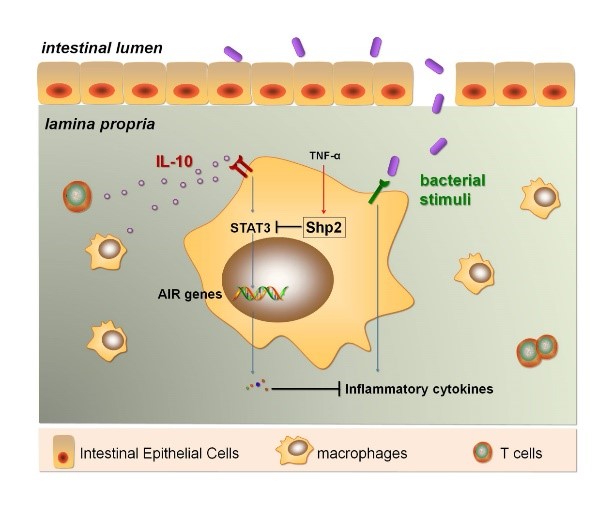On Jan.04,the Journal of Experimental Medicine (J Exp Med) published online the latest research result from Professor Yuehai Ke’s group "Phosphatase Shp2 exacerbates intestinal inflammation by disrupting macrophage responsiveness to interleukin-10". The study demonstrate that phosphatase Shp2 restrains IL-10-mediated deactivation of macrophages and thus supports the progression of intestinal inflammation..
Inflammatory cytokines produced by activated macrophages largely contribute to the pathological signs of inflammatory bowel disease (IBD). Interelukin-10 (IL-10) is the predominant anti-inflammatory cytokine in the intestine and its therapeutic efficacy for IBD has been clinically tested. Nevertheless, how the function of IL-10 is regulated in the intestinal microenvironment remains unknown, which largely hinders the further development of IL-10-based therapeutic strategies. This work found that the expression of phosphatase Shp2 was increased in colonic macrophages and blood monocytes from IBD patients compared to those from healthy controls. Shp2 deficiency in macrophages protects mice from colitis and colitis-driven colon cancer. Mechanistically, Shp2 disrupts IL-10/STAT3 signaling and its dependent anti-inflammatory response in human and mouse macrophages. Furthermore, a Shp2-inducing role of TNF-α is unveiled. Collectively, this study identifies Shp2 as a detrimental factor for intestinal immune homeostasis and hopefully will be helpful in the future exploitation of IL-10 immunotherapy for IBD.
Dr. Peng Xiao and graduate student Huilun Zhang from Zhejiang University School of Medicine are the first authors of this study. The corresponding authors of this article are Professor Yuehai Ke and Professor Qian Cao. This study was supported by the National Natural Science Foundation, Key Project of the National Natural Science Foundation of China, Natural Science Foundation of Zhejiang Province, and Fundamental Research Funds for the Central Universities.
LINK:http://jem.rupress.org/content/early/2019/01/03/jem.20181198

Working Model: Loss of Shp2 potentiates IL-10/STAT3 signaling and its dependent deactivating programs in macrophages, thus decreasing their production of inflammatory cytokines and reducing the severity of colitis. Furthermore, TNF-α has the ability to upregulate Shp2 expression in macrophages, suggesting that IL-10 supplementation may achieve higher anti-inflammatory efficacy when used in combination with anti-TNF-α antibody.